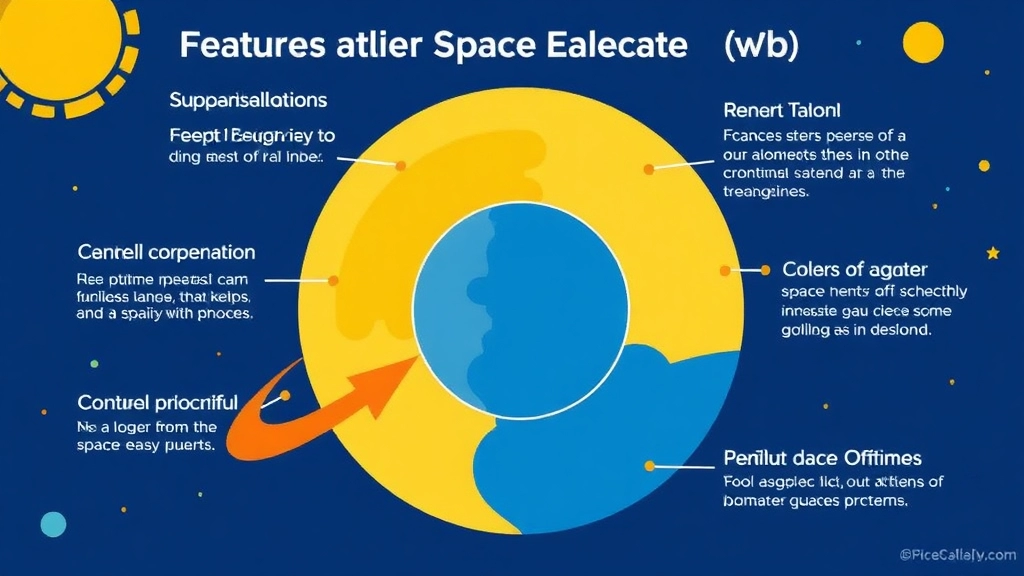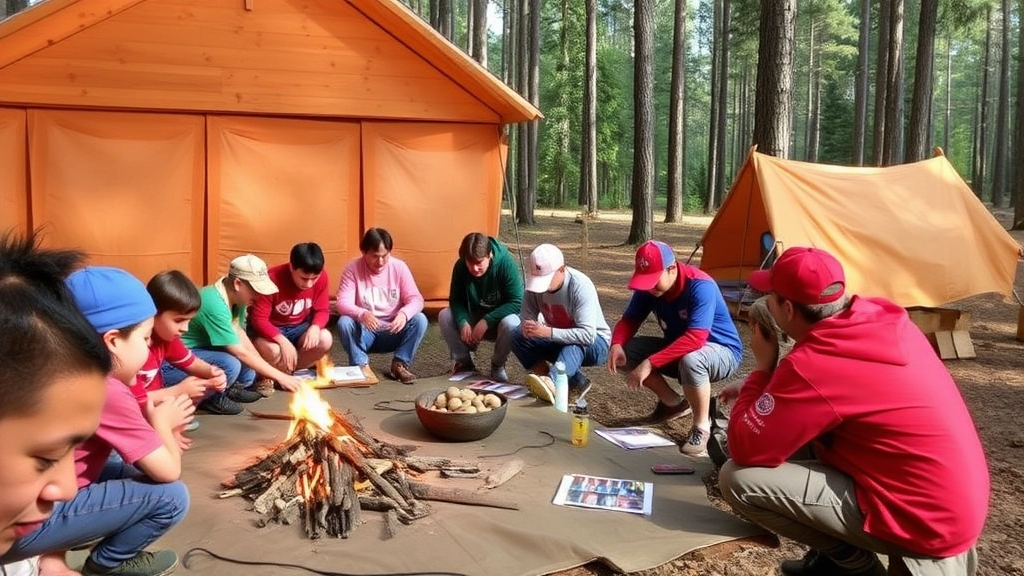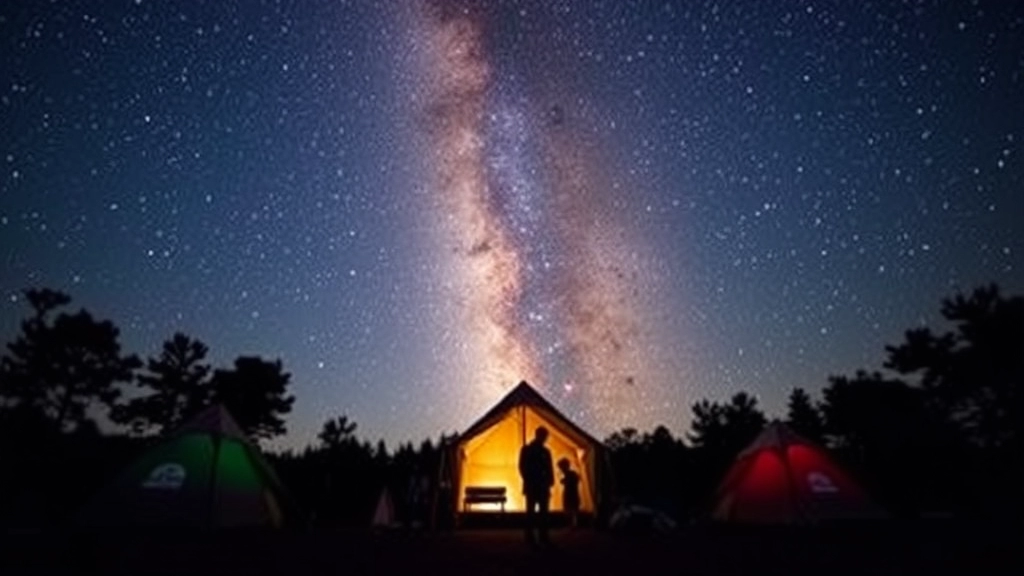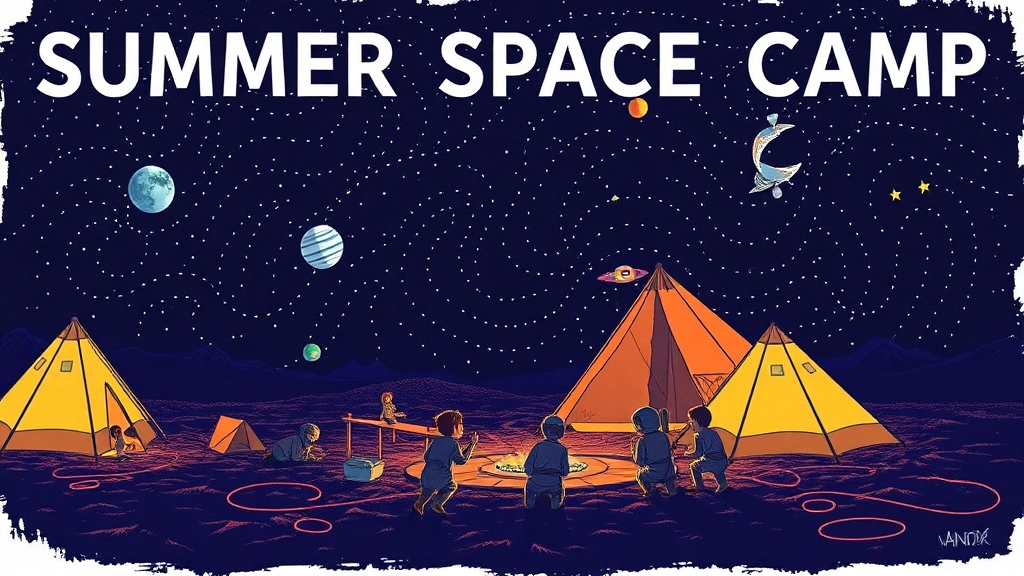Summer Space Camp: An Unforgettable Educational Adventure
If you’re searching for an unforgettable educational adventure, look no further than a Summer Space Camp. These camps, like the renowned U.S. Space & Rocket Center’s Space Camp or Camp Kennedy Space Center, offer hands-on experiences that ignite a passion for STEM (Science, Technology, Engineering, and Mathematics) and space exploration.
Activities at Summer Space Camp
At Summer Space Camp, participants dive into activities that mimic real astronaut training, from team-building exercises to simulated space missions. Whether you’re a parent seeking a unique summer program for your child or a student eager to explore the cosmos, these camps provide a perfect blend of learning and excitement.
Don’t Miss Out!
Don’t miss out on this stellar opportunity to reach for the stars!
Types of Space Camps Available
Hey there! Ever wondered what types of space camps are out there? You’re not alone. Many parents and kids are curious about the different options available. Let’s dive in and break it down in a way that’s easy to understand and super engaging.
Traditional Space Camps
First off, we have the Traditional Space Camps. These are the classic camps most people think of when they hear “space camp.” They cover the basics of space exploration, astronaut training, and even some cool science experiments. Perfect for those who want a well-rounded experience.
Key Features:
- Astronaut Training: Simulators, zero-gravity environments, and spacewalk practices.
- Rocket Building: Hands-on activities to design and launch your own rockets.
- Space Missions: Team-based missions to solve space-related challenges.
Advanced Space Camps
Next up are the Advanced Space Camps. These camps are for those who’ve already got a taste of space and want more. Think of it as levelling up your space game.
Key Features:
- Advanced Simulations: More complex and realistic simulations of space missions.
- Specialised Workshops: Topics like astrophysics, robotics, and advanced engineering.
- Extended Missions: Longer, more detailed missions that require teamwork and problem-solving.
Family Space Camps
Ever thought about experiencing space camp with your family? That’s where Family Space Camps come in. These camps allow families to bond over their shared love of space.
Key Features:
- Family Activities: Activities designed for all ages, from kids to adults.
- Collaborative Missions: Missions that require family members to work together.
- Educational Sessions: Sessions tailored for parents and children to learn together.
Virtual Space Camps
In today’s digital age, Virtual Space Camps are becoming more popular. These camps bring the excitement of space exploration right to your living room.
Key Features:
- Online Simulations: Interactive online simulations that mimic real-life space missions.
- Live Classes: Live-streamed classes with space experts and astronauts.
- DIY Projects: At-home projects that you can do with materials you already have.
Specialised Space Camps
Lastly, we have Specialised Space Camps. These camps focus on specific areas of space science and exploration, perfect for those with a particular interest.
Key Features:
- Focused Curriculum: In-depth focus on topics like planetary science, space medicine, or astrobiology.
- Expert Lectures: Talks and workshops by experts in the field.
- Research Projects: Opportunities to work on real research projects.
Why Choose a Specialised Camp?
If you or your child has a specific interest in a certain area of space science, these camps can provide a deeper and more enriching experience.
So, there you have itâfive types of space camps that cater to different interests and levels of experience. Whether you’re a newbie or a seasoned space enthusiast, there’s a camp out there for you. And trust me, attending one of these camps can be a life-changing experience. So, what are you waiting for? Blast off into the world of space camps and find the one that’s perfect for you!
For more ideas on how to make your camp experience memorable, check out our cabin themes for summer camp and explore various summer themes for an unforgettable camp.
Key Features of Summer Space Camps

Ever wondered what makes summer space camps so special?
Why do kids and teens rave about them?
Let’s break it down.
Hands-On Learning
Space camps aren’t just about sitting in a classroom.
You get to touch, build, and experiment.
- Rocket Building: Create and launch your own rockets.
- Astronaut Simulations: Experience zero gravity and spacewalks.
- Robotics: Build and program robots to complete space missions.
Expert Guidance
Who teaches you?
Not just any random teacher.
You learn from real astronauts, scientists, and engineers.
These folks have been there, done that.
They share their stories, their failures, and their successes.
Cutting-Edge Technology
Think you know tech?
Think again.
Space camps use the latest in VR, AR, and space simulation software.
You get to explore Mars, navigate space stations, and even pilot spacecraft.
Teamwork and Leadership
Space isn’t a solo mission.
You’ll work in teams to solve problems and complete missions.
- Mission Control: Take on roles like Commander, Pilot, and Scientist.
- Problem Solving: Face real-time challenges and think on your feet.
- Leadership: Step up and lead your crew to success.
Real-Life Applications
What’s the point if you can’t use it in real life?
Space camps teach skills that go beyond space.
- Critical Thinking: Analyze situations and make quick decisions.
- Communication: Learn to convey complex ideas simply.
- Perseverance: Fail, learn, and try again.
Fun and Adventure
Let’s be real.
It’s not all serious.
There’s a ton of fun too.
- Space-Themed Games: Think scavenger hunts and trivia.
- Social Events: Meet like-minded space enthusiasts.
- Outdoor Activities: Sometimes, it’s good to get some fresh air.
Inclusivity and Diversity
Space camps welcome everyone.
No matter your background, you’re part of the team.
- Scholarships: Financial aid to ensure everyone can join.
- Support: Staff trained to handle diverse needs and backgrounds.
So, what’s stopping you?
Summer space camps are more than just a holiday.
They’re a life-changing experience.
Age Groups and Eligibility Criteria
Alright, let’s dive into the nitty-gritty of age groups and eligibility criteria for space camps. You might be wondering, “Is my kid too young or too old for space camp?” or “Do they need to be a science whiz to get in?” These are legit concerns, so let’s break it down.
Who Can Attend Space Camp?
Space camps cater to a wide range of age groups, so there’s likely a perfect fit for your kiddo. Here’s the scoop:
- Junior Space Campers (Ages 7-9): These camps are designed for the younger crowd. They’re all about sparking interest in space and science with fun, hands-on activities. No need for any prior knowledge, just a curiosity about the cosmos.
- Intermediate Space Campers (Ages 10-12): This group gets a bit more into the science and tech side of things. They’ll engage in more detailed simulations and experiments. Still, no need to be a mini Einstein; just a love for space exploration will do.
- Teen Space Campers (Ages 13-18): Teens get the full experience. They dive into advanced simulations, use professional-grade equipment, and even work on team projects. Some camps might require a basic understanding of science and math, but passion goes a long way.
- Adult Space Campers: Yes, adults can join the fun too! These camps are perfect for teachers, parents, or anyone with a keen interest in space. It’s never too late to chase those astronaut dreams.
Eligibility Criteria
Now, let’s talk about what you need to get in. Most space camps have pretty straightforward eligibility criteria:
- Age: As mentioned, camps are divided by age groups. Make sure to check the specific age range for the camp you’re interested in.
- Interest in Space: While a deep knowledge of space isn’t required, a genuine interest is crucial. Camps are designed to be educational and fun, but they do involve learning and participation.
- Physical Fitness: Some camps, especially those with more intense simulations, might have basic fitness requirements. This is to ensure safety during activities like zero-gravity simulations or spacewalk practices.
- Application: Most camps require an application form. This might include questions about your child’s interests, any relevant experience, and sometimes a short essay or personal statement.
Real Talk: What Parents Worry About
I get it, sending your kid to space camp can be nerve-wracking. Here are some common concerns and how to address them:
- “Is my child too young?” If your child is within the camp’s age range, they’re not too young. Camps are designed to be age-appropriate and engaging for each group.
- “Do they need to be a science genius?” Absolutely not. Enthusiasm and curiosity are the main ingredients. Camps are there to teach and inspire, not test existing knowledge.
- “What about safety?” Camps prioritise safety. They have trained staff, medical facilities, and strict protocols to ensure a safe environment for all campers.
In a Nutshell
Space camps are designed to be inclusive and inspiring. Whether your child is a budding scientist or just curious about the stars, there’s a camp for them. The key is to match their age and interest level with the right program. So, don’t stress too much about the detailsâfocus on the incredible experience they’re about to have.
Got more questions? Don’t hesitate to reach out to the camp organisers. They’re there to help you navigate the process and ensure your child has a stellar experience. For more insights, you might want to check out our ultimate guide to summer camp planning and our tips on budget-friendly summer camp costs.
Typical Camp Activities and Simulations

Ever wondered what it’s really like to be an astronaut?
Space camps aren’t just about looking at stars and planets.
Nope.
They dive deep into hands-on activities and simulations that get you as close to space as you can get without leaving Earth.
Mission Simulations
First up, mission simulations.
This is the bread and butter of space camps.
You get to experience what it’s like to be part of a space mission.
Think:
- Commanding a spacecraft
- Navigating through space
- Communicating with mission control
It’s like being in a real-life sci-fi movie.
Astronaut Training
Next, let’s talk astronaut training.
You’ll get a taste of the physical and mental challenges astronauts face.
Expect:
- Zero-gravity simulations – Ever wondered what floating feels like? You’ll find out.
- Spacewalk practice – Yes, you’ll suit up and ‘walk’ in simulated space conditions.
- Team-building exercises – Because space missions are all about teamwork.
Science Experiments
But wait, there’s more.
Space camps aren’t just about simulations.
They’re also about science.
You’ll dive into experiments that teach you about:
- Rocketry – Build and launch your own mini-rocket.
- Astrobiology – Study life forms that could exist in space.
- Physics – Understand how things work differently in a zero-gravity environment.
Interactive Workshops
You didn’t think it was all just physical activities, did you?
Interactive workshops are a big part of the experience.
You’ll get to:
- Design your own space mission – Plan everything from the launch to the landing.
- Learn about space technology – Get hands-on with the gadgets and gear.
- Meet real astronauts – Hear their stories and ask your burning questions.
Field Trips
And let’s not forget the field trips.
These aren’t your average school trips.
Think visits to:
- Space museums – See real spacecraft and astronaut suits.
- Planetariums – Get a close-up look at stars, planets, and galaxies.
- Space agencies – If you’re lucky, you might even visit NASA or ESA facilities.
Why It’s Awesome
So, why should you care about all these activities?
Because they’re not just fun—they’re educational.
You’ll walk away with:
- New skills – From teamwork to problem-solving.
- In-depth knowledge – About space, science, and technology.
- Inspiration – To maybe, just maybe, pursue a career in space.
And that’s what makes space camp worth every second.
Benefits of Attending Space Camp
Ever wondered what it would be like to train like an astronaut? Or maybe you’re just curious about the cosmos and want to dive deep into the universe’s mysteries. Well, attending a space camp might just be your ticket. Let’s break down the real benefits of signing up for a space camp.
Real-World Experience
Hands-on Training:
At space camp, you’re not just sitting in a classroom. You get to experience real-world astronaut training. Think of it as a mini NASA boot camp. You’ll be using simulators, taking part in mission scenarios, and even doing spacewalk simulations. It’s a full-on immersive experience.
Teamwork and Leadership:
Space missions aren’t solo endeavours. At camp, you’ll work in teams, learning how to communicate effectively and lead under pressure. These are skills that’ll stick with you long after camp is over.
Enhanced STEM Knowledge
Science, Technology, Engineering, and Maths:
Space camps are a goldmine for anyone interested in STEM. You’ll dive deep into subjects like astronomy, physics, and robotics. And the best part? You’ll see how these subjects apply to real-world space missions.
Innovative Learning:
Forget boring textbooks. Space camps use cutting-edge technology and interactive lessons. You’ll be building rockets, programming robots, and maybe even designing your own space mission.
Career Insights
Meet the Experts:
Ever dreamt of meeting an astronaut or a space scientist? At space camp, you get to interact with industry experts. They’ll share their experiences, answer your burning questions, and maybe even inspire your future career path.
Career Pathways:
Whether you want to be an astronaut, an engineer, or a space scientist, space camp gives you a clear view of what it takes to get there. You’ll learn about different career options and the education paths to follow.
Personal Growth
Confidence Boost:
There’s something incredibly empowering about completing a space mission simulation or successfully launching a rocket. These experiences boost your confidence and show you what you’re capable of.
Problem-Solving Skills:
Space missions are filled with unexpected challenges. At camp, you’ll learn to think on your feet and solve problems creatively. These skills are invaluable, no matter what career you choose.
Fun and Friendship
Unique Experiences:
From zero-gravity simulations to stargazing sessions, space camp is packed with unique experiences you won’t find anywhere else. It’s not just educational â it’s a blast!
Lifelong Friendships:
You’ll be surrounded by like-minded individuals who share your passion for space. Many campers form lifelong friendships and stay connected long after camp ends.
Real Stories from Past Campers
Let me share a quick story. I remember meeting a camper named Jess. She was a bit shy and unsure of herself at first. But after completing a challenging mission simulation, she was beaming with confidence. Jess went on to pursue a degree in aerospace engineering and is now working on satellite technology. Space camp was a turning point for her, and she’s just one of many success stories.
In Summary
Attending space camp isn’t just about learning â it’s about growing, experiencing, and dreaming big. Whether you’re aiming for the stars or just curious about what’s out there, space camp offers a plethora of benefits that can shape your future. For more unique experiences, check out our ultimate guide to fun activities at summer camp. And if you’re interested in more specialized camps, don’t miss our list of top math camps for summer 2024.
Registration Process and Deadlines

Thinking about joining a space camp but worried about the registration process and deadlines?
Don’t sweat it.
I’ve got you covered.
Registering for a space camp is pretty straightforward, but you’ve got to be on top of those deadlines.
Here’s a quick rundown on how to get it done:
Step 1: Choose Your Camp
First things first, decide which space camp you want to attend. There are loads of options out there, so pick one that fits your interests and schedule.
Step 2: Check the Requirements
Each camp has its own set of eligibility criteria. Make sure you meet the age requirements and any other prerequisites.
Step 3: Gather Your Info
Before you start the registration, have all your info handy. You’ll need:
- Personal details (name, age, contact info)
- Medical info (allergies, dietary restrictions)
- Emergency contacts
Step 4: Fill Out the Application
Most camps have an online application form. It’s usually a breeze, but take your time to fill it out accurately.
Step 5: Pay the Fee
You’ll often need to pay a registration fee. Some camps offer early bird discounts, so keep an eye out for those.
Step 6: Submit and Confirm
Once you’ve filled out the form and paid the fee, hit submit. You should get a confirmation email. If you don’t, follow up.
Deadlines Matter
Deadlines are crucial. Most camps fill up fast, so register as early as possible. Here’s a pro tip:
- Early Bird Deadlines: Usually a few months before the camp starts. You might get a discount.
- Regular Deadlines: Typically a month or two before the camp.
- Late Registration: Some camps offer late registration, but it’s risky. You might miss out if the camp is full.
Quick Story:
A mate of mine missed the early bird deadline by a day. He ended up paying extra and almost didn’t get a spot. Don’t be that guy.
Final Thoughts
Registering for space camp is easy if you stay organised. Mark those deadlines on your calendar and get your info ready. Trust me, the last thing you want is to miss out because you didn’t register in time.
Scholarship and Financial Aid Opportunities
Ever wondered how to afford space camp without breaking the bank? Scholarships and financial aid could be your golden ticket. Many aspiring astronauts and space enthusiasts worry about the cost, but don’t let that stop you. Here’s how you can make it happen.
Types of Scholarships Available
Merit-Based Scholarships:
- Awarded based on academic achievements or specific talents.
- Often require essays, recommendation letters, and a strong application.
Need-Based Scholarships:
- Designed for families who may not have the financial means.
- Usually require proof of income and detailed financial information.
Special Interest Scholarships:
- Offered to students with particular interests or backgrounds.
- Examples include scholarships for women in STEM or underrepresented minorities.
Financial Aid Options
Payment Plans:
- Many camps offer flexible payment plans.
- Break down the total cost into manageable monthly payments.
Early Bird Discounts:
- Register early to snag discounts.
- Some camps offer significant savings for early registration.
Sponsorships:
- Look for local businesses or community organisations willing to sponsor a portion of the cost.
- Schools and educational foundations sometimes offer grants for educational camps.
How to Apply for Scholarships and Financial Aid
- Research Early:
- Start your search at least six months in advance.
- Check the camp’s website for specific scholarship opportunities.
- Prepare Your Documents:
- Have your academic records, essays, and recommendation letters ready.
- Gather financial documents if applying for need-based aid.
- Follow Instructions:
- Pay attention to deadlines and specific application requirements.
- Missing a detail could mean missing out on funding.
- Seek Help:
- Don’t hesitate to ask the camp’s administration for guidance.
- They often have resources or tips for securing funding.
Real Stories from Past Campers
Emma’s Journey:
Emma, a 14-year-old aspiring astronaut, thought space camp was out of reach due to her family’s financial situation. She applied for a need-based scholarship and received full funding. Emma’s experience at space camp solidified her passion for space exploration, and she’s now on a path to study aerospace engineering.
Liam’s Leap:
Liam, a top student in his class, applied for a merit-based scholarship. His essay on the importance of space exploration and his stellar academic record earned him a spot at camp. Liam’s time at space camp led to a summer internship at a local observatory, where he continues to fuel his passion for astronomy.
Tips for Preparing for Space Camp

So, you’re gearing up for Space Camp? Exciting, right? But maybe you’re feeling a bit nervous or unsure about what to expect. Don’t worry, I’ve got you covered. Here are some practical tips to help you get ready and make the most out of your experience.
Start with the Basics
First things first, let’s talk about what you need to pack.
- Comfortable Clothing: You’ll be moving around a lot, so pack comfy clothes and trainers.
- Toiletries: Basic stuff like toothpaste, soap, and a towel.
- Notebook and Pen: Trust me, you’ll want to jot down notes and cool facts.
Know the Schedule
Understanding the daily schedule can help ease some anxiety.
- Morning Briefings: Usually, you’ll start with a briefing. Be on time.
- Simulations and Activities: These will take up most of your day. Be prepared for both physical and mental challenges.
- Free Time: Yes, you’ll get some downtime. Use it to relax or socialise.
Brush Up on Basics
You don’t need to be a rocket scientist, but a little knowledge goes a long way.
- Basic Astronomy: Know your planets and basic space facts.
- Simple Physics: Understanding gravity and motion can help during simulations.
Get Fit
Space Camp isn’t just about sitting in a classroom.
- Physical Fitness: Some activities are physically demanding. A bit of exercise beforehand can make a big difference.
- Hydration: Keep hydrated. It’s easy to forget when you’re having fun.
Mental Prep
Your brain needs a workout too.
- Problem-Solving Skills: You’ll face challenges that require quick thinking.
- Teamwork: Many tasks are group-based. Being a team player is crucial.
Social Skills
You’re going to meet new people.
- Open Mind: Be ready to meet campers from different backgrounds.
- Communication: Clear communication can make group tasks smoother.
Set Goals
What do you want to get out of Space Camp?
- Learning Objectives: Maybe you want to learn more about space missions.
- Personal Goals: Making new friends or overcoming a fear of public speaking.
Final Checks
Before you head out, double-check everything.
- Registration Details: Make sure you’ve got all the paperwork sorted.
- Contact Information: Keep emergency contact info handy.
Real Talk
I remember my first Space Camp. I was a mix of excitement and nerves. But preparation made all the difference. I packed right, brushed up on my basics, and went in with an open mind. By the end of it, I not only learned a ton but also made lifelong friends.
Testimonials and Success Stories from Past Campers
Ever wondered if Space Camp is worth it? You’re not alone. Many folks have doubts about whether it’s just a gimmick or a life-changing experience. Let me share some real stories and testimonials from past campers. Trust me; these are genuine accounts that will put your mind at ease.
Real Stories from Real People
Sarah, 14, from Manchester: “I was super nervous about going to Space Camp. I mean, who wouldn’t be? But the moment I stepped in, I knew I was in for something special. The simulations were so real, and I even got to experience a zero-gravity environment. It was like stepping into a sci-fi movie!”
Jake, 16, from London: “Before Space Camp, I was just an average kid with an interest in space. But after attending, I felt like I had a clear path to my future. The instructors were amazing, and I made friends who shared my passion. It was a game-changer for me.”
Key Takeaways from Their Experiences
- Confidence Boost: Many campers like Sarah felt a significant boost in their self-confidence. The immersive activities and hands-on learning made them feel like they could tackle anything.
- Career Clarity: Jake’s story is a testament to how Space Camp can provide clarity on career choices. If you’re unsure about your future, this could be the nudge you need.
- Lifelong Friendships: Campers often talk about the friendships they forge during their time at camp. These bonds can last a lifetime and provide a support network for years to come.
Success Stories: From Campers to Astronauts
Believe it or not, some past campers have gone on to achieve extraordinary things. Here are a couple of standout examples:
- Dr. Kate Rubins: Before she was an astronaut, she was a Space Camp attendee. Her time at camp ignited her passion for space exploration, leading her to a career at NASA.
- Chris Hadfield: Another Space Camp alumnus, Hadfield became a renowned astronaut and even commanded the International Space Station. His journey started with a dream, just like yours.
Why These Stories Matter
These testimonials and success stories aren’t just for show; they highlight the transformative power of Space Camp. Whether you’re looking to boost your confidence, find your career path, or make lifelong friends, Space Camp offers something for everyone.
If you’re looking for more inspiration, check out our top summer camp musicals that can also boost confidence and creativity. And for those interested in hands-on activities, our summer camp art ideas offer a unique way to express yourself and make lasting memories.
Comparison of Popular Space Camps
Ever wondered which space camp is right for you? I get it. There are loads of options, and it can be overwhelming. Let’s break it down.
Space Camp USA vs. European Space Camp
Space Camp USA
- Location: Huntsville, Alabama
- Age Groups: 9-18 years
- Key Features:
- Simulated Space Missions: Think you’re an astronaut? Prove it.
- Astronomy Lessons: Get your head around the stars.
- Rocket Building: Yes, you build and launch your own rockets.
European Space Camp
- Location: Andøya, Norway
- Age Groups: 17-20 years
- Key Features:
- Sounding Rocket Launch: Real rockets, real launches.
- Aurora Borealis: Northern Lights, baby.
- Team Projects: Collaborate with future space scientists.
Space Camp Turkey vs. Space Camp Canada
Space Camp Turkey
- Location: Izmir, Turkey
- Age Groups: 9-15 years
- Key Features:
- Space Shuttle Simulations: Feel like you’re in space.
- Astronaut Training: Feel the G-force.
- Robotics Workshops: Build and program robots.
Space Camp Canada
- Location: Montreal, Quebec
- Age Groups: 10-17 years
- Key Features:
- Mars Rover Simulations: Drive on Mars.
- Planetarium Shows: The universe in high-def.
- STEM Labs: Hands-on science and tech.
Key Comparisons
- Location: Choose based on convenience and your dream destination.
- Age Groups: Make sure you fit the criteria.
- Unique Features: Each camp offers something special. Pick what excites you the most.
Real Stories
I remember a camper from Space Camp USA who built a rocket that reached 1,000 feet. He said it was the best moment of his life.
Another camper from European Space Camp saw the Northern Lights for the first time. She said it was magical, like something out of a dream.
Final Thoughts
Choosing the right space camp can be a game-changer. It’s not just about the activities; it’s about the experience. Think about what excites you. Is it launching rockets? Seeing the Northern Lights? Driving a Mars rover? Make your pick and get ready for an out-of-this-world adventure.
If you’re looking for more creative ways to engage campers, check out these creative summer camp day themes. And for those planning to attend, don’t miss our summer camp packing essential tips and tricks.
FAQs About Summer Space Camp
What makes summer space camps unique?
Summer space camps are unique because they offer hands-on learning, expert guidance from real astronauts and scientists, cutting-edge technology, and activities that promote teamwork and leadership.
What kind of activities can I expect at a space camp?
Activities include rocket building, astronaut simulations, robotics, mission simulations, science experiments, interactive workshops, and field trips to space museums and planetariums.
Who are the instructors at space camps?
Instructors are often real astronauts, scientists, and engineers who share their real-world experiences and knowledge.
Is there any physical training involved?
Yes, physical training is a part of the camp. You may experience zero-gravity simulations, spacewalk practice, and team-building exercises.
Are space camps inclusive and diverse?
Absolutely. Space camps welcome participants from all backgrounds and often offer scholarships and support to ensure everyone can join.
How do I register for a space camp?
Registration involves choosing your camp, checking the requirements, gathering your info, filling out the application, paying the fee, and submitting the form. It’s important to keep an eye on deadlines.
What should I pack for space camp?
Pack comfortable clothing, toiletries, and a notebook and pen. It’s also a good idea to bring any personal items you might need.
How can I prepare mentally and physically for space camp?
Brush up on basic astronomy and physics, get some physical exercise, and work on your problem-solving and teamwork skills. Being mentally prepared will enhance your experience.
What are the deadlines for registration?
Deadlines vary but generally include early bird deadlines (a few months before camp), regular deadlines (a month or two before camp), and sometimes late registration. It’s best to register early to secure your spot and possibly get a discount.
How will attending space camp benefit me in the long run?
Space camp teaches critical skills like problem-solving, communication, and perseverance. It also provides inspiration and knowledge that could influence your future career choices.
Is there any financial aid available?
Many space camps offer scholarships and financial aid to ensure that everyone has the opportunity to participate.
What kind of technology will I get to use at space camp?
You’ll get hands-on experience with the latest VR, AR, and space simulation software, allowing you to explore Mars, navigate space stations, and pilot spacecraft.
Can I meet real astronauts at space camp?
Yes, many space camps include opportunities to meet and interact with real astronauts, who share their experiences and answer your questions.
References
-
Space Camp Official Website
-
NASA – What is Space Camp?
-
Space.com – Space Camp Overview

